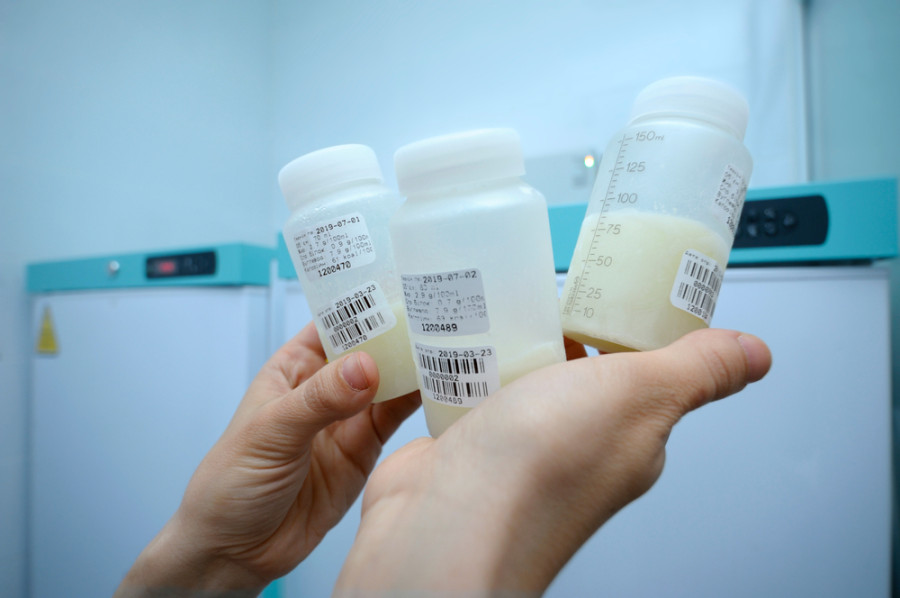Health
Human breast milk bank set up at Paropakar Maternity Hospital
The first-of-its-kind milk bank is crucial to saving babies born early, health workers say.
Aakriti Ghimire
The nutrition section of the Department of Health’s Family Welfare Division on Monday announced a ‘Human Breast Milk Bank’ that has been set up at Paropakar Maternity Hospital, Thapathali.
Officials said the milk bank was set up keeping in mind the benefits of breastfeeding and the rampant problem of malnutrition among children in the Valley. The bank will provide human breast milk to children in need, they said.
“There can be children who are underweight, born early, may have lost their mothers during childbirth or whose mothers are unable to feed them,” Lila Bikram Thapa, nutrition chief at the section, said. “We will be able to provide breast milk to such children through the bank.”
Around 15 million babies are born preterm around the world every year, and that number is particularly high in low and middle-income countries like Nepal, according to medical experts.
An estimated 36 percent of children under five years are stunted (have low height-for-age) and 10 percent are acutely malnourished or wasted (have low weight-for-height) in Nepal.
Breast milk, which contains fat, proteins, carbohydrates and various minerals and vitamins, is crucial for a stronger immunity for children, and to make them healthy and disease-free.
The WHO recommends exclusive breastfeeding up to 6 months of age, with continued breastfeeding along with appropriate complementary feeds up to 2 years of age or beyond.
Paediatricians commend the government announcement of a first-of-its-kind human milk bank in Nepal set up inaugurating the World Breastfeeding Week.
World Breastfeeding Week is observed every year in the first week of August. The global campaign is aimed at anchoring breastfeeding as part of good nutrition, food security and reducing inequalities and strengthening the capacity of actors and systems for transformational change.
“The newly set-up milk bank is the first in Nepal and it is extremely crucial and much awaited,” said Smriti Mathema, paediatrician at Kathmandu Medical College, Sinamangal. “Such milk banks are crucial in preventing infections in newborns, particularly for preterm babies—babies born early.”
In Nepal, it is reported that around 81,000 babies are born preterm every year.
Doctors say breast milk plays a major role to ensure the survivability and healthy growth of babies, specifically for those admitted to the neonatal intensive care units (NICUs).
“Human breast milk has a lot of immunoglobulins that cannot be manufactured in factories,” explained Mathema, who also runs the Lactation Consultation and Breastfeeding Support Clinic at the Kathmandu Medical College. “In addition, it can help prevent a lot of infections. Now with a milk bank, children will no longer have to rely on formula milk.”
With a better healthcare system, doctors have been able to salvage a lot of preterm babies. Doctors say that a milk bank will be crucial to ensuring that many such babies will receive the utmost care.
“Previously, it would be challenging for us to take care of preterm babies, but now, with milk banks, we can particularly save these children who are admitted to NICUs,” Mathema added.
The establishment of a human breast milk bank is crucial to realising Nepal’s commitment to Sustainable Development Goals 2030 by ending preventable deaths of newborns and children under 5 years of age.
The bank will collect breast milk from healthy lactating mothers with their consent. The donor milk will undergo various methods of purification before being provided to the babies, Thapa said, adding that the bank aims to provide human breast milk to 6,000 children in need per year.
Officials said the Department of Health is also planning on setting up such banks in other hospitals across the country.




 10.12°C Kathmandu
10.12°C Kathmandu















